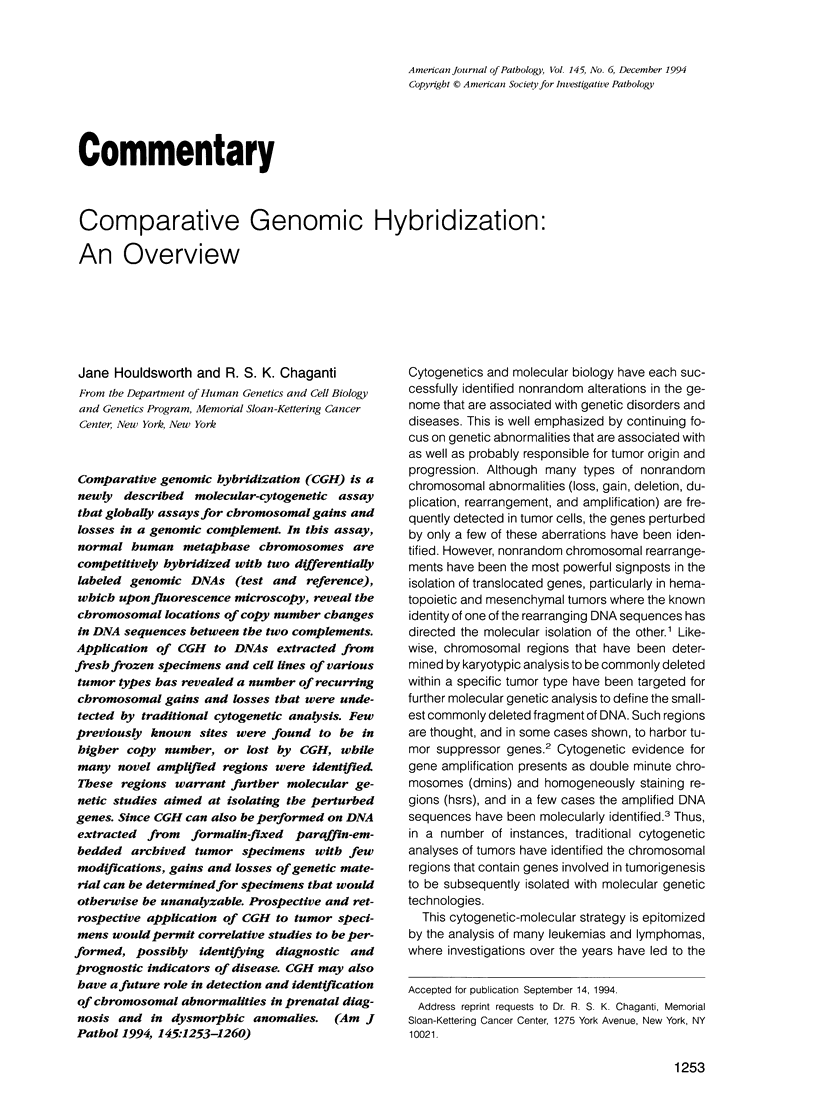Abstract
Comparative genomic hybridization (CGH) is a newly described molecular-cytogenetic assay that globally assays for chromosomal gains and losses in a genomic complement. In this assay, normal human metaphase chromosomes are competitively hybridized with two differentially labeled genomic DNAs (test and reference), which upon fluorescence microscopy, reveal the chromosomal locations of copy number changes in DNA sequences between the two complements. Application of CGH to DNAs extracted from fresh frozen specimens and cell lines of various tumor types has revealed a number of recurring chromosomal gains and losses that were undetected by traditional cytogenetic analysis. Few previously known sites were found to be in higher copy number, or lost by CGH, while many novel amplified regions were identified. These regions warrant further molecular genetic studies aimed at isolating the perturbed genes. Since CGH can also be performed on DNA extracted from formalin-fixed paraffin-embedded archived tumor specimens with few modifications, gains and losses of genetic material can be determined for specimens that would otherwise be unanalyzable. Prospective and retrospective application of CGH to tumor specimens would permit correlative studies to be performed, possibly identifying diagnostic and prognostic indicators of disease. CGH may also have a future role in detection and identification of chromosomal abnormalities in prenatal diagnosis and in dysmorphic anomalies.
Full text
PDF







Images in this article
Selected References
These references are in PubMed. This may not be the complete list of references from this article.
- Bishop J. M. Molecular themes in oncogenesis. Cell. 1991 Jan 25;64(2):235–248. doi: 10.1016/0092-8674(91)90636-d. [DOI] [PubMed] [Google Scholar]
- Isola J., DeVries S., Chu L., Ghazvini S., Waldman F. Analysis of changes in DNA sequence copy number by comparative genomic hybridization in archival paraffin-embedded tumor samples. Am J Pathol. 1994 Dec;145(6):1301–1308. [PMC free article] [PubMed] [Google Scholar]
- Kallioniemi A., Kallioniemi O. P., Piper J., Tanner M., Stokke T., Chen L., Smith H. S., Pinkel D., Gray J. W., Waldman F. M. Detection and mapping of amplified DNA sequences in breast cancer by comparative genomic hybridization. Proc Natl Acad Sci U S A. 1994 Mar 15;91(6):2156–2160. doi: 10.1073/pnas.91.6.2156. [DOI] [PMC free article] [PubMed] [Google Scholar]
- Kallioniemi A., Kallioniemi O. P., Sudar D., Rutovitz D., Gray J. W., Waldman F., Pinkel D. Comparative genomic hybridization for molecular cytogenetic analysis of solid tumors. Science. 1992 Oct 30;258(5083):818–821. doi: 10.1126/science.1359641. [DOI] [PubMed] [Google Scholar]
- Kallioniemi O. P., Kallioniemi A., Piper J., Isola J., Waldman F. M., Gray J. W., Pinkel D. Optimizing comparative genomic hybridization for analysis of DNA sequence copy number changes in solid tumors. Genes Chromosomes Cancer. 1994 Aug;10(4):231–243. doi: 10.1002/gcc.2870100403. [DOI] [PubMed] [Google Scholar]
- Marshall C. J. Tumor suppressor genes. Cell. 1991 Jan 25;64(2):313–326. doi: 10.1016/0092-8674(91)90641-b. [DOI] [PubMed] [Google Scholar]
- Mohamed A. N., Macoska J. A., Kallioniemi A., Kallioniemi O. P., Waldman F., Ratanatharathorn V., Wolman S. R. Extrachromosomal gene amplification in acute myeloid leukemia; characterization by metaphase analysis, comparative genomic hybridization, and semi-quantitative PCR. Genes Chromosomes Cancer. 1993 Nov;8(3):185–189. doi: 10.1002/gcc.2870080308. [DOI] [PubMed] [Google Scholar]
- Muleris M., Almeida A., Gerbault-Seureau M., Malfoy B., Dutrillaux B. Detection of DNA amplification in 17 primary breast carcinomas with homogeneously staining regions by a modified comparative genomic hybridization technique. Genes Chromosomes Cancer. 1994 Jul;10(3):160–170. doi: 10.1002/gcc.2870100303. [DOI] [PubMed] [Google Scholar]
- Ried T., Petersen I., Holtgreve-Grez H., Speicher M. R., Schröck E., du Manoir S., Cremer T. Mapping of multiple DNA gains and losses in primary small cell lung carcinomas by comparative genomic hybridization. Cancer Res. 1994 Apr 1;54(7):1801–1806. [PubMed] [Google Scholar]
- Schröck E., Thiel G., Lozanova T., du Manoir S., Meffert M. C., Jauch A., Speicher M. R., Nürnberg P., Vogel S., Jänisch W. Comparative genomic hybridization of human malignant gliomas reveals multiple amplification sites and nonrandom chromosomal gains and losses. Am J Pathol. 1994 Jun;144(6):1203–1218. [PMC free article] [PubMed] [Google Scholar]
- Shiloh Y., Mor O., Manor A., Bar-Am I., Rotman G., Eubanks J., Gutman M., Ranzani G. N., Houldsworth J., Evans G. DNA sequences amplified in cancer cells: an interface between tumor biology and human genome analysis. Mutat Res. 1992 May;276(3):329–337. doi: 10.1016/0165-1110(92)90019-6. [DOI] [PubMed] [Google Scholar]
- Solomon E., Borrow J., Goddard A. D. Chromosome aberrations and cancer. Science. 1991 Nov 22;254(5035):1153–1160. doi: 10.1126/science.1957167. [DOI] [PubMed] [Google Scholar]
- Speicher M. R., Prescher G., du Manoir S., Jauch A., Horsthemke B., Bornfeld N., Becher R., Cremer T. Chromosomal gains and losses in uveal melanomas detected by comparative genomic hybridization. Cancer Res. 1994 Jul 15;54(14):3817–3823. [PubMed] [Google Scholar]
- Speicher M. R., du Manoir S., Schröck E., Holtgreve-Grez H., Schoell B., Lengauer C., Cremer T., Ried T. Molecular cytogenetic analysis of formalin-fixed, paraffin-embedded solid tumors by comparative genomic hybridization after universal DNA-amplification. Hum Mol Genet. 1993 Nov;2(11):1907–1914. doi: 10.1093/hmg/2.11.1907. [DOI] [PubMed] [Google Scholar]
- Suijkerbuijk R. F., Olde Weghuis D. E., Van den Berg M., Pedeutour F., Forus A., Myklebost O., Glier C., Turc-Carel C., Geurts van Kessel A. Comparative genomic hybridization as a tool to define two distinct chromosome 12-derived amplification units in well-differentiated liposarcomas. Genes Chromosomes Cancer. 1994 Apr;9(4):292–295. doi: 10.1002/gcc.2870090410. [DOI] [PubMed] [Google Scholar]
- du Manoir S., Speicher M. R., Joos S., Schröck E., Popp S., Döhner H., Kovacs G., Robert-Nicoud M., Lichter P., Cremer T. Detection of complete and partial chromosome gains and losses by comparative genomic in situ hybridization. Hum Genet. 1993 Feb;90(6):590–610. doi: 10.1007/BF00202476. [DOI] [PubMed] [Google Scholar]




